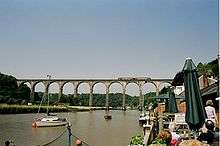Calstock
- For the community in Cochrane District, Ontario, Canada, see: Calstock, Ontario
| Calstock | |
| Cornish: Kalstok | |
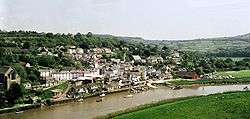 Calstock village from the viaduct |
|
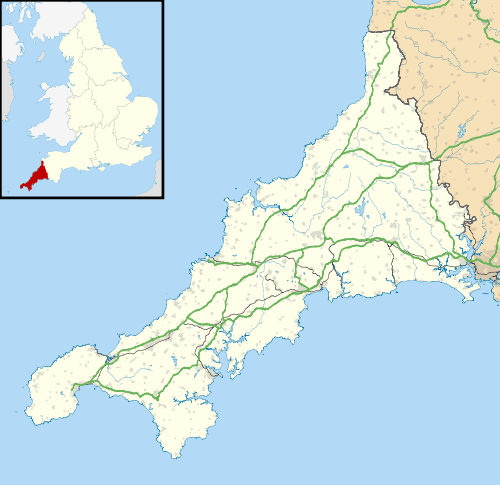 Calstock |
|
| Population | 6,431 (2011) |
|---|---|
| OS grid reference | SX4368 |
| Civil parish | Calstock |
| Unitary authority | Cornwall |
| Ceremonial county | Cornwall |
| Region | South West |
| Country | England |
| Sovereign state | United Kingdom |
| Post town | CALSTOCK GUNNISLAKE |
| Postcode district | PL18 |
| Dialling code | 01822 |
| Police | Devon and Cornwall |
| Fire | Cornwall |
| Ambulance | South Western |
| EU Parliament | South West England |
| UK Parliament | South East Cornwall |
Coordinates: 50°29′49″N 4°12′36″W / 50.497°N 4.210°W
Calstock (Cornish: Kalstok[1]) is a civil parish and a large village in south east Cornwall, England, United Kingdom, on the border with Devon. The village is situated on the River Tamar 6 miles (9.7 km) south west of Tavistock and 10 miles (16 km) north of Plymouth.[2]
The parish had a population of 6,095 in the 2001 census.[3] This had increased to 6,431 at the 2011 census.[4] The parish encompasses 5,760 acres (23.3 km2) of land, 70 acres (0.28 km2) of water, and 44 acres (0.18 km2) of the tidal Tamar.[5]
As well as Calstock, other settlements in the parish include Albaston, Chilsworthy, Gunnislake, Harrowbarrow, Latchley, Metherell, Coxpark, Dimson, Drakewalls, Norris Green, Rising Sun and St Ann's Chapel.[6]
Calstock village is within the Tamar Valley AONB, is overlooked by Cotehele house and gardens, and lies on the scenic Tamar Valley railway. Calstock railway station opened on 2 March 1908. The village is twinned with Saint-Thuriau in Brittany, France.
Early history
There is evidence of human settlement in Calstock from Roman, or pre-Roman times, settlers attracted by the rich source of minerals, such as tin, in the area. A Roman fort, only the third known in Cornwall, was discovered next to the church in 2008.[7]
In Saxon times Calstock was in the Kingdom of Cornwall, which resisted the spread of Wessex from the east. In 838 CE Wessex had spread as far as the Tamar, and a battle for independence was fought near Calstock. Following the Norman Conquest, Calstock manor was recorded in the Domesday Book. The Saxon manor (held by Asgar) was taken over, and in the 14th century became part of the Duchy of Cornwall: one of the 17 Antiqua maneria. At the time of Domesday Book (1086) the manor was held by Reginald from Robert, Count of Mortain. There were two and a half hides of land and land for 12 ploughs. Reginald held one virgate of land with 2 ploughs and 12 serfs. 30 villeins and 30 smallholders had the rest of the land with 6 ploughs. There were 100 acres of woodland, 3 square leagues of pasture and 3 pigs. The value of the manor was £3 sterling though it had formerly been worth £6.[8] The manor was sold by the Duchy to John Williams of Scorrier House circa 1807.[9]
Mining and transport
Mining was important in Calstock from Mediaeval times, with the Duchy mining silver. The industry was booming in the late 19th century, and the discovery of copper, coupled with nearby granite quarrying, made Calstock a busy port. The rapid population boom due to the growth of industry led, in 1849, to an outbreak of cholera. The industry declined in the early 20th century due to foreign competition, and now only the ruined pump houses that dot the landscape remain.
The Tamar is navigable to boats past Calstock some 3 miles (4.8 km) upstream to Morwellham Quay with some 10 feet (3.0 m) or even 20 feet (6.1 m) of water at extreme spring tides. Calstock Quay was once important for transporting goods, and in the Victorian era when steamers brought tourists to the village, Calstock was visited by Queen Victoria and Prince Albert in 1846. The importance of the river as a transport route declined with the construction of the 14 miles (23 km) Tamar Valley railway at the start of the 20th century. The village is still dominated by the railway's viaduct. The viaduct, constructed entirely from precast concrete blocks, was first crossed by truck on 8 August 1907 and first used by passengers on 2 March 1908.
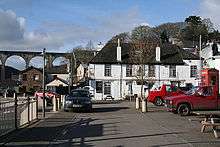
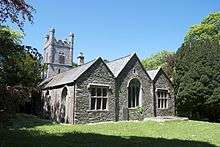
Parish church of St Andrew
The church (pictured below) was built partly in the early and partly in the late 15th century: the western tower is of three stages and of granite. At the east end of each aisle are rectangular windows of three lights. The Edgcumbe Chapel contains two monuments of the late 17th- century: to Piers Edgcumbe (1666) and to Jemima, Countess of Sandwich (1674). The rectory is the work of Decimus Burton, 1853–54.[10]
Primary school
Calstock Community Primary School was built in 1901 and opened on 6 January 1902. At that time the school consisted of just two main classrooms. It has since been extended with the addition of the infant suite plus the Head Teacher's office which has to be shared with the school secretary. The infant suite extension won an award for architectural design, in keeping with the remainder of the school. The centenary of the school was celebrated in the summer of 2002.[11]
Literary associations
The poetry publisher Peterloo Poets, founded by Harry Chambers, was based in Calstock from 1976 until it closed down in 2009.[12]
See also
References
- ↑ "List of Place-names agreed by the MAGA Signage Panel" (PDF). Cornish Language Partnership. May 2014. Retrieved 11 January 2015.
- ↑ Ordnance Survey: Landranger map sheet 201 Plymouth & Launceston ISBN 978-0-319-23146-3
- ↑ Office for National Statistics & Cornwall County Council, 2001. Parish population statistics
- ↑ "2011 census". Retrieved 6 February 2015.
- ↑ Calstock Online Parish Clerk, 2005. Calstock Parish.
- ↑ Cornwall; Explore Britain
- ↑ Smart, Chris; et al. "Calstock Roman Fort". Department of Archaeology, the University of Exeter. Retrieved 10 October 2016.
- ↑ Thorn, C. et al., ed. (1979) Cornwall. Chichester: Phillimore; entry 5,2,12
- ↑ "The Rise of the Williamses, of Scorrier". The Cornishman (37). 27 March 1879. p. 8.
- ↑ Pevsner, N. (1970) Cornwall; 2nd ed., revised by Enid Radcliffe. Harmondsworth: Penguin; p. 49
- ↑ "Our School". Calstock Community Primary School. Retrieved 23 August 2009.
- ↑ Peterloo Poets. "Harry Chambers". Retrieved 29 March 2015.
External links
| Wikimedia Commons has media related to Calstock. |
